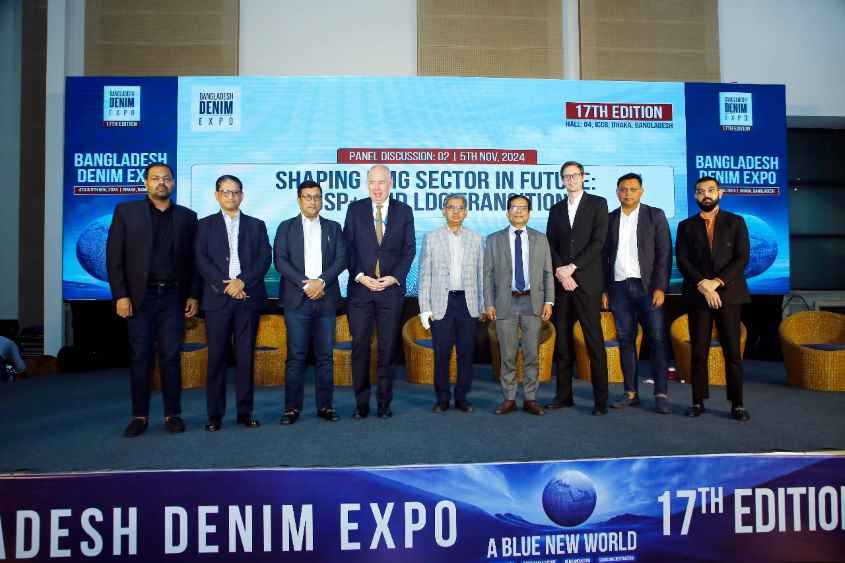
The Bangladesh Denim Expo is a pivotal international platform dedicated to showcasing the vibrant Bangladesh denim industry and driving it towards a sustainable future, embracing the vision of “A Blue New World”.
The two-day, Bangladesh Denim Expo was organized by Bangladesh Apparel Exchange on 4th & 5th Nov 2024 at ICCB, Dhaka, Bangladesh where over 45 exhibitors from 7 countries showcased their latest denim products, fabrics, accessories, chemicals, technologies etc.
Moreover, the two-day event was a remarkable journey of knowledge and inspiration. With two dynamic panel discussions, the knowledge shared by our internationally recognized panelists has inspired and motivated us all.
Over 5543 visitors from 56 countries joined us for this edition, making it a truly global experience.
On the 2nd day of the event, Panel Discussions 2: Shaping RMG Sector in Future: GSP+ and LDC Transition, session addressed the critical issues surrounding Bangladesh’s transition from LDC status by 2029 and the need to secure GSP+ eligibility to maintain market access.
Distinguished speakers of this panel M Riaz Hamidullah (Moderator), Additional Foreign Secretary (Multilateral and Regional), Ministry of Foreign Affairs, Government of the People’s Republic of Bangladesh said “Many people believe that Bangladesh would be able to meet all of the expectations. But there are a lot of challenges. I think at the end, liberty, inclusion, and transparency will be the key. Labor rights are also a value proposition.”
Dr. Mostafa Abid Khan, Component Manager, Support for Sustainable Graduation Project (SSGP), Economic Relations Division, Ministry of Finance. Said “We are excessively reliant on the garment sector. And it is effectively flourishing in Bangladesh.
For the EU, Bangladesh is a success story. The EU is very interested in providing continued access to GSP+ to BD. BD has to adhere to compliance with the due diligence set by the EU.”
Edwin Koekkoek, First Counsellor & Team Leader, Green Inclusive Development, Delegation of the European Union to Bangladesh, said “In the area of sustainability, due diligence is a key element. In Bangladesh, we can see progress on labor rights and environmental standards. The decarbonization of Bangladesh will be a priority.”
Mohammad Sohel Sadat, Chairman, Shin Shin Group, said “The sustainability of manufacturing is continuously evolving. We have bigger scope in labor condition improvement and bring it to the next level. I think, among all stakeholders, the labor condition is important. We have to build up our image and educate the workforce. We need to educate entrepreneurs and also the workers on what needs to be done. We are practicing social sustainability in Bangladesh, and we have to showcase how and what we are doing. We have to work very closely with the customer, brands, and stakeholders. I must say all stakeholders—government, labor union, NGO, foreign delegates—have to go into detail to bring in the solution. But we need to do it together.”
Ole Rosenborg Justesen, Sector Counsellor, Embassy of Denmark in Bangladesh, said “I would focus on 3 areas in terms of working with Bangladesh. They are labor rights, labor law & inspection, and investments in the supply chain. Labor inspection is absolutely crucial in terms of improving the working conditions of factories. We have to talk about investments in whole infrastructures. Instead of seeing due diligence as a hindrance i would suggest considering it as a competitiveness.”
Professor Mustafizur Rahman, Distinguished Fellow, Centre for Policy Dialogue (CPD), said “I’m very hopeful that the success story of the Bangladeshi RMG industry will continue. Bangladesh is very poised for LDC graduation. I think we will have to restructure the incentives in terms of the challenges that are coming. My proposition will be that brands and buyers will have to help our entrepreneurs in terms of technology transfer, labor compliance, and other standards. I think it is a good business proposition for brands and buyers to work with the entrepreneurs. The new generation knows compliance as the new normal. You will have to give the workers rights. Its human rights. You can use it as a selling point.”
Shah Rayeed Chowdhury, Director, Evince Group, said “One of the key things is not to forget the basics of our business: relationship with the buyers. We are investing in automation. The man behind the machine is more important. That is why we’re investing a lot in team building. We’re trying to think of automation in a different manner to remain competitive in the long run. Compliance is a mandatory mindset.”
Ziaur Rahman, Regional Country Manager, Production (Bangladesh, Pakistan & Ethiopia), H&M, said “This industry is a four-decade-old industry. Our supply chain is much behind in terms of labor law. Awareness level is much less than what it’s supposed to be. In terms of due diligence law, many suppliers are not fully aware of it and what areas they need to comply with. I think we have the basic recipe, and we need to start from there.”



